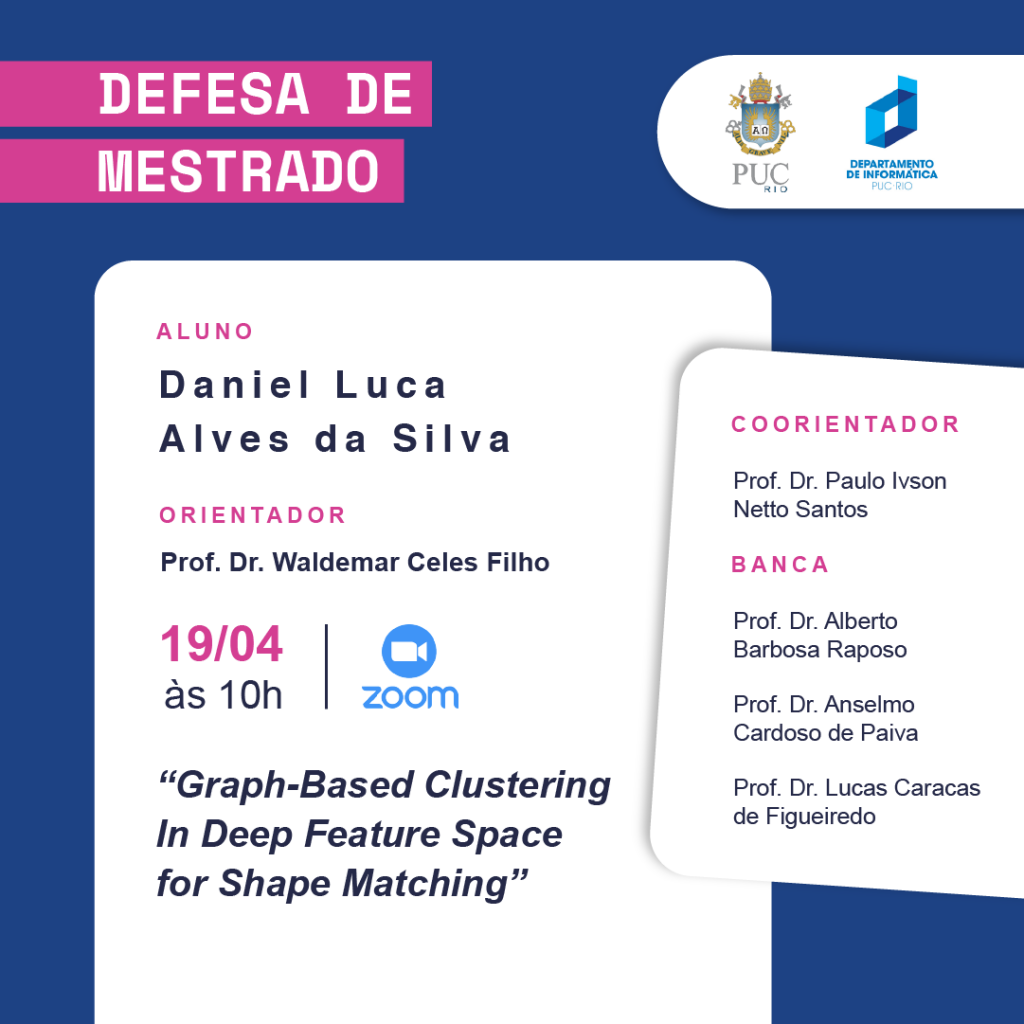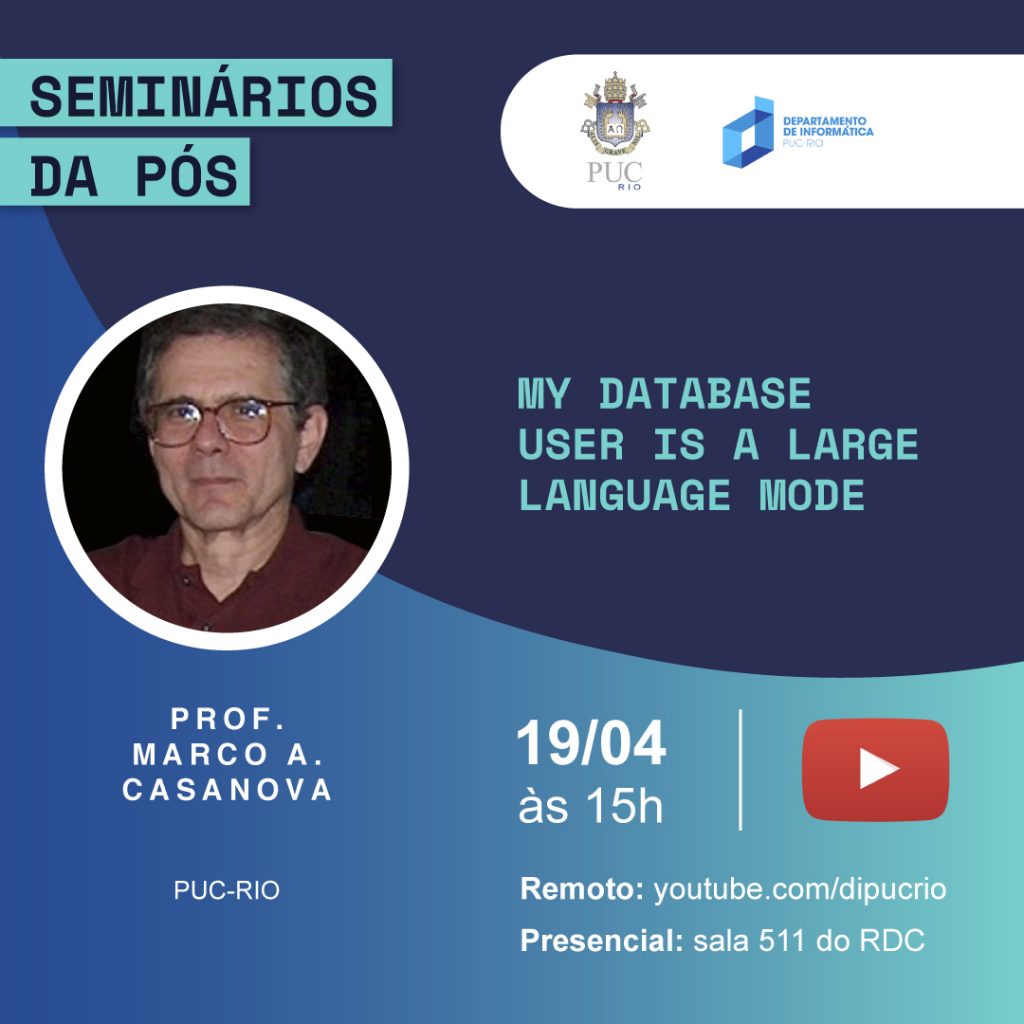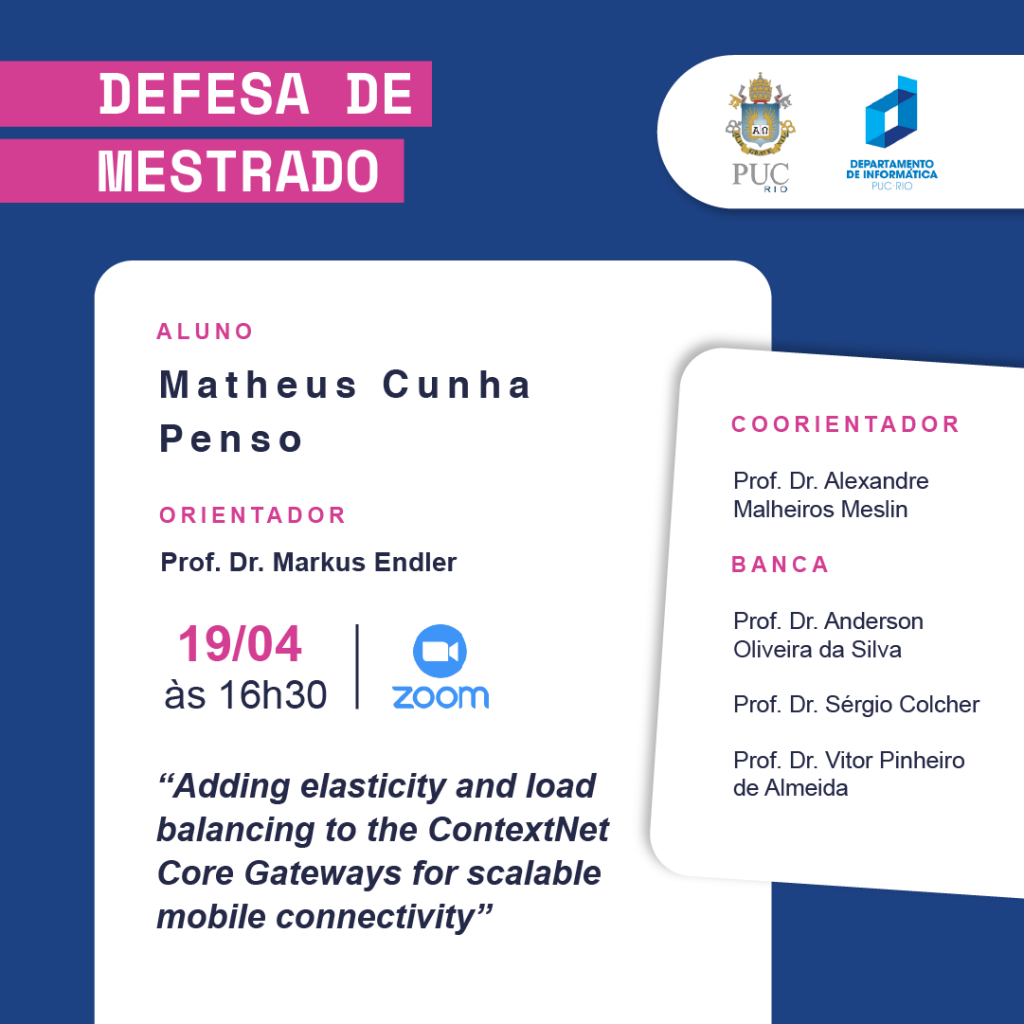Autor: Marcelo Costalonga Cardoso
Orientador: Marcos Kalinowski
Data e Hora: 29/04/2024 às 10:00
Local: Videoconferência
Autor: Fernando Antonio Dantas Gomes Pinto
Orientador: Edward Hermann Haeusler
Data e Hora: 26/04/2024 às 09:30
Local: RDC 511
Autor: Pedro Thiago Cutrim dos Santos
Orientador: Sérgio Colcher
Data e Hora: 29/04/2024 às 09:00
Local: Videoconferência
 Defesa de Dissertação de Mestrado do aluno Daniel Luca Alves.
Defesa de Dissertação de Mestrado do aluno Daniel Luca Alves.
Título da dissertação: Graph-Based Clustering In Deep Feature Space for Shape Matching
Resumo: Engineering projects rely on complex 3D CAD models throughout their life cycle. These 3D models consist of millions of geometries that impose challenges in storage, transmission, and rendering. Previous works have successfully employed shape matching techniques based on deep learning to reduce the memory required by these 3D models. In this work, we propose a graph-based algorithm that improves unsupervised clustering in deep feature space. This approach greatly improves shape matching accuracy and results in even lower memory requirements for the 3D models. In a labeled dataset, our method achieves a 95% model reduction, outperforming previous unsupervised techniques that achieved 87% and almost reaching the 97% reduction from a fully supervised approach. In an unlabeled dataset, our method achieves an average model reduction of 87% versus an average reduction of 77% from previous unsupervised techniques.
Orientador: Prof. Dr. Waldemar Celes Filho
Co-orientador: Prof. Dr Paulo Ivson Netto Santos
Banca: Prof. Dr. Alberto Barbosa Raposo | Prof. Dr. Anselmo Cardoso de Paiva | Prof. Dr. Lucas Caracas de Figueiredo
Assista a defesa pelo link: https://puc-rio.zoom.us/j/94119149852?pwd=dFpZTkR2Rll1NHZoM3pORmVicXRoZz09
 Dia 19, às 15h, acontecerá o seminário “My Database User is a Large Language Mode“, proferido pelo professor Marco A. Casanova.
Dia 19, às 15h, acontecerá o seminário “My Database User is a Large Language Mode“, proferido pelo professor Marco A. Casanova.
Seminário da Pós: “My Database User is a Large Language Mode”
Resumo do Seminário: The leaderboards of familiar benchmarks indicate that the best text-to-SQL tools are based on Large Language Models (LLMs). However, when applied to real-world databases, the performance of LLM-based text-to-SQL tools is significantly less than that reported for these benchmarks. A closer analysis reveals that one of the problems lies in that the relational schema is an inappropriate specification of the database from the point of view of the LLM. In other words, the target user of the database specification is the LLM, rather than an end-user or a database programmer. This talk then argues that the text-to-SQL task can be greatly facilitated by providing a database specification based on the use of LLM-friendly views that are close to the language of the users’ questions and that eliminate frequently used joins, and LLM-friendly data descriptions of the database values. The talk first introduces a proof-of-concept implementation of three sets of LLM-friendly views over a relational database, whose design is inspired by a proprietary relational database, and a set of 100 Natural Language (NL) questions that mimic those posed by users. The talk then presents experiments to test a text-to-SQL prompt strategy implemented with LangChain, using GPT-3.5 and GPT-4, over the sets of LLM-friendly views and data samples, as the LLM-friendly data descriptions. The results suggest that the specification of LLM-friendly views and the use of data samples, albeit not too difficult to implement over a real-world relational database, are sufficient to considerably improve the accuracy of the prompt strategy. The talk concludes with a discussion of the results obtained and suggests further approaches to simplify the text-to-SQL task.
Conheça o Professor: Marco is Full Professor at the Department of Informatics and Coordinator of the Central Planning and Evaluation Office of the Pontifical Catholic University of Rio de Janeiro – PUC-Rio. He graduated in Electronic Engineering at the Military Institute of Engineering (1974), obtained a M.Sc. in Informatics from PUC-Rio (1976) and a M.Sc. (1977) and a Ph.D. (1979) in Applied Mathematics from Harvard University. He was Graduate Program Coordinator (2005-2007) and Director (2007-2011) of the Department of Informatics of PUC-Rio. His research interests concentrate on database conceptual modeling and construction of database management systems. In July 2012, he received the Scientific Merit Award from the Brazilian Computer Society.
Você pode assisti-lo presencialmente na sala 511 do RDC ou via Youtube pelo link: https://youtube.com/live/Sx1_D5wW1q0
 Defesa de Dissertação de Mestrado do aluno Matheus Cunha Penso.
Defesa de Dissertação de Mestrado do aluno Matheus Cunha Penso.
Título da dissertação: Adding elasticity and load balancing to the Context Net Core Gateways for scalable mobile connectivity
Resumo: As IoT increasingly incorporates mobile devices and objects, this also calls for scalable services capable of handling an increasing number of simultaneously connected mobile devices. As a result, the ability to provide reliable, efficient, and highperformance services in a highly mobile environment is crucial to meeting user expectations and driving mass adoption of mobile IoT (IoMT) applications. In this work we designed and implemented a self-scalable architecture for mobile communications using Kubernetes in ContextNet, a home-brewed IoMT distributed middleware, and evaluated the performance of our implementation in different scalability and mobility scenarios.
Orientador: Prof. Dr. Markus Endler
Co-orientador: Prof. Dr Alexandre Malheiros Meslin
Banca: Prof. Dr. Anderson Oliveira da Silva | Prof. Dr. Sérgio Colcher | Prof. Dr. Vitor Pinheiro de Almeida
Assista a defesa pelo link: https://zoom.us/j/7099156117?pwd=VXVxYnQvMjZmdnA1TlRmQmtrUTNrZz09
 O curso Compliance de Dados e Formação de DPO, oferecido em conjunto pelo Departamento de Informática (DI) e pelo Instituto de Direito da PUC-Rio, tem como objetivo abordar temas jurídicos e técnicos a fim de especializar profissionais interessados em atuar como encarregados de proteção de dados, cargo que vem sendo cada vez mais requisitado pelas empresas.
O curso Compliance de Dados e Formação de DPO, oferecido em conjunto pelo Departamento de Informática (DI) e pelo Instituto de Direito da PUC-Rio, tem como objetivo abordar temas jurídicos e técnicos a fim de especializar profissionais interessados em atuar como encarregados de proteção de dados, cargo que vem sendo cada vez mais requisitado pelas empresas.
O curso é voltado para profissionais de segurança da informação; advogados ou mediadores; profissionais de compliance; e gestores com noções de LGPD, cybersecurity e normas.
Além disso, ele também é voltado para pessoas que tenham interesse em realizar formação como encarregado de proteção de dados. Não há necessidade de formação jurídica ou em ciência de dados e sistemas de segurança para participar do curso.
As aulas estão confirmadas para acontecer entre 30 de abril e 20 de junho, por meio da plataforma Zoom. Os interessados ainda podem se inscrever até o dia 30 de abril. Não perca!
Inscreva-se no link: https://www.cce.puc-rio.br/sitecce/website/website.dll/folder?nCurso=compliance-de-dados-e-formacao-de-dpo&nInst=cce
 Defesa de Dissertação de Mestrado da aluna Debora Stuck Delgado de Souza.
Defesa de Dissertação de Mestrado da aluna Debora Stuck Delgado de Souza.
Título da dissertação: Ferramenta de Anotação de Vídeos Semiautomática
Resumo: Cada vez mais os vídeos fazem parte do nosso cotidiano. Plataformas como Youtube, Facebook e Instagram, recebem uma grande quantidade de horas de vídeos diariamente. Com isso, vem crescendo o interesse em resolver problemas ligados à área de Visão Computacional. No caso do Aprendizado Supervisionado, a qualidade das anotações dos dados é mais um ponto importante para o sucesso das pesquisas. Existem várias ferramentas de anotação disponíveis no mercado, porém poucas com o foco nos quadros relevantes e com suporte a modelos de Inteligência Artificial. Somado a isso, é perceptível a crescente busca em se obter dados estatísticos de diversos esportes, principalmente futebol, tanto para melhoria de performance de atletas e equipes quanto para plataformas de apostas. Neste sentido, este trabalho consiste na criação de uma ferramenta de anotação de vídeos semiautomática, focada na detecção de ações e conectada a um modelo de Rede Neural Convolucional (RNC) treinado em vídeos de partidas de futebol, que apresenta sugestões para validação do anotador. Para novas classificações, as features extraídas da RNC são reduzidas com a Principal Component Analysis (PCA) e a Distributed Stochastic Neighbor Embedding (t-SNE) para a utilização do algoritmo de K-Nearest Neighbors (KNN). Além disso, o sistema possibilita a conexão entre pessoas que possuam um conjunto de dados e anotadores.
Orientador: Prof. Dr. Helio Côrtes Vieira Lopes
Co-orientador: Prof. Dr. Luiz José Schirmer Silva
Banca: Profª. Drª. Simone Diniz Junqueira Barbosa | Prof. Dr. Alberto Barbosa Raposo | Prof. Dr. Fernando Alberto Correia dos Santos Junior
Assista a defesa pelo link: https://puc-rio.zoom.us/j/94915325039?pwd=ZUpaWXlIRGtDa1F4bDdvc0hIUHF5UT09
Autor: Matheus Cunha Penso
Orientador: Markus Endler
Data e Hora: 19/04/2024 às 16:30
Local: Videoconferência
Autor: Debora Stuck Delgado de Souza
Orientador: Hélio Côrtes Vieira Lopes
Data e Hora: 19/04/2024 às 15:30
Local: Videoconferência

